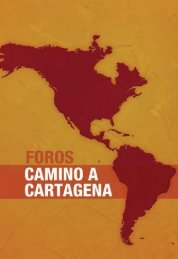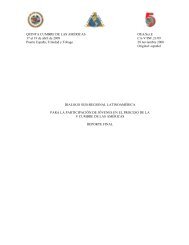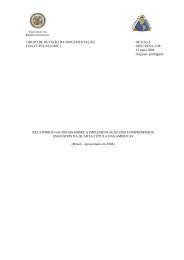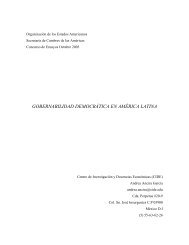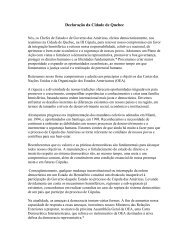The Road to Hemispheric Cooperation: Beyond the Cartagena
The Road to Hemispheric Cooperation: Beyond the Cartagena
The Road to Hemispheric Cooperation: Beyond the Cartagena
You also want an ePaper? Increase the reach of your titles
YUMPU automatically turns print PDFs into web optimized ePapers that Google loves.
THE SuMMITS Of THE AMERICAS AND THE<br />
INTER-AMERICAN SySTEM<br />
Jaime Aparicio-Otero* I Partner at Aparicio, Arp, Schamis & Associates<br />
Executive Summary<br />
●● <strong>The</strong> deadlock during <strong>the</strong> 2012 Summit of <strong>the</strong> Americas<br />
in <strong>Cartagena</strong>, Colombia exposed divisions in <strong>the</strong> hemisphere<br />
on issues such as Cuba and drug policy, and resulted<br />
in no common declaration. This situation calls for<br />
a thorough re-formulation of <strong>the</strong> objectives and methods<br />
of this process.<br />
●● After analyzing <strong>the</strong> inter-American system and <strong>the</strong><br />
current institutional structure of <strong>the</strong> summit process,<br />
<strong>the</strong> paper points <strong>to</strong> its challenges and offers recommendations<br />
<strong>to</strong> address <strong>the</strong>m for future ga<strong>the</strong>rings.<br />
●● For <strong>the</strong> 2015 Panama Summit of <strong>the</strong> Americas, <strong>the</strong><br />
evaluation and follow-up mechanisms should be improved<br />
<strong>to</strong> make sure that <strong>the</strong> process remains credible.<br />
●● Mandates in <strong>the</strong> next summit should bring concrete<br />
actions, set in place easily measurable tasks, and<br />
clearly identify <strong>the</strong> resources available <strong>to</strong> undertake<br />
actions in compliance with <strong>the</strong> summit mandates.<br />
●● Future summits in <strong>the</strong> future should restructure and<br />
better coordinate <strong>the</strong> work of inter-American institutions,<br />
in order <strong>to</strong> more effectively support governments<br />
in implementing <strong>the</strong> summit mandates.<br />
●● Specific summit mandates given <strong>to</strong> each inter-American<br />
institution should become part of <strong>the</strong> budgets and<br />
agendas of those organizations.<br />
●● Summits should provide effective follow-up mechanisms<br />
at <strong>the</strong> national level, as well as better coordination<br />
and efficiency of current follow-up mechanisms at<br />
<strong>the</strong> multilateral level.<br />
●● <strong>The</strong> follow-up of summit mandates should be done in<br />
closer cooperation with civil society.<br />
●● Summits of <strong>the</strong> Americas should only include those countries<br />
that maintain <strong>the</strong>ir commitments <strong>to</strong> democratic governance,<br />
human rights and rule of law.<br />
●● <strong>The</strong> Organization of American States (OAS) should<br />
become again <strong>the</strong> political heart of <strong>the</strong> inter-American<br />
system, centered on democracy, human rights, political<br />
and legal cooperation, security and elec<strong>to</strong>ral observation,<br />
while o<strong>the</strong>r functions are delegated <strong>to</strong> <strong>the</strong> system’s<br />
specialized agencies.<br />
●● <strong>The</strong> Permanent Council should be replaced with a nonpermanent<br />
Council of Ministers of Foreign Affairs. This<br />
Council would meet periodically with <strong>the</strong> OAS secretary<br />
general <strong>to</strong> be briefed about <strong>the</strong> implementation of <strong>the</strong><br />
General Assembly and summit mandates.<br />
●● Inter-American institutions, especially <strong>the</strong> Inter-American<br />
Development Bank (IDB), should streng<strong>the</strong>n <strong>the</strong> current<br />
summit follow-up ministerial forums <strong>to</strong> better coordinate<br />
and foster cooperation in <strong>the</strong> implementation of mandates.<br />
This coordination should include regular consultation<br />
with civil society and <strong>the</strong> private sec<strong>to</strong>r.<br />
●● U.S. foreign policy should take note that Latin America<br />
is less economically dependent upon <strong>the</strong> United States<br />
than in previous his<strong>to</strong>ric moments. This reduces <strong>the</strong><br />
political leverage of <strong>the</strong> United States in <strong>the</strong> summit<br />
process and increases <strong>the</strong> need for building diplomatic<br />
alliances and political will in <strong>the</strong> region.<br />
●● <strong>The</strong> paper ends by evaluating <strong>the</strong> current political dynamic<br />
of <strong>the</strong> relations between <strong>the</strong> United States and Latin<br />
America in <strong>the</strong> framework of <strong>the</strong> summit process.<br />
* Jaime Aparicio-Otero, a partner at Aparicio, Arp, Schamis & Associates, previously served as Bolivia’s ambassador <strong>to</strong> <strong>the</strong> Organization<br />
of American States and as chair of <strong>the</strong> Inter-American Juridical Committee.<br />
<strong>The</strong> <strong>Road</strong> <strong>to</strong> <strong>Hemispheric</strong> <strong>Cooperation</strong>: <strong>Beyond</strong> <strong>the</strong> <strong>Cartagena</strong> Summit of <strong>the</strong> Americas<br />
<strong>The</strong> Brookings Institution ❘ Latin America Initiative<br />
90



